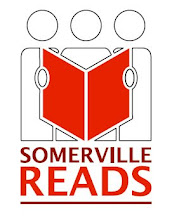The Somerville Public Library and the Somerville Reads team are pleased to introduce guest blogger Sarah Wolf. Sarah is a library volunteer who attended last Thursday night’s book discussion of
Farm City, led by Jessie Banhazl. Many thanks to all who attended and especially Jessie and Sarah.
I turn you over to Sarah:

Oakland, California seems like the last place on earth one might find a farm. In her memoir
Farm City, Novella Carpenter makes a case for it being one of the best. When she and her boyfriend Bill decide to make their home in “Ghost Town,” one of the rougher neighborhoods in the area, they immediately see its potential and apply their urban farmer instincts to their new plot of land. Establishing a “squatters’ garden” in an abandoned lot that flourishes into a community garden of sorts is only the beginning. Carpenter takes up beekeeping and raises and slaughters livestock, including a turkey called Harold and two enormous pigs. Cataloging the struggles and triumphs of her endeavors,
Farm City is the story of a woman who wants to see sustainable life even in a place long-abandoned by society – she wants to prove that even the ghetto holds promise.
On Thursday, April 5, Jessie Banhazl of
Green City Growers, who’s also a Somerville urban farmer, led a discussion of the book in the Main Library. Jessie spends her day installing raised bed gardens all over the greater Boston area and thus has an informed perspective on Carpenter’s endeavors. “She wasn’t fearless, but she acted that way,” Jessie said.
The discussion began with why Carpenter could farm without too much protest from the neighbors. There are places where keeping chickens might become the heart of a heated public debate, but that didn’t ever seem to be the case for Carpenter, no matter how loud – or smelly – her animals were. Most of her neighbors were preoccupied with individual survival – and the the garden benefited everyone, since Carpenter shared whatever she grew with whoever wanted some. The land wasn’t hers, after all – and each of her neighbors was doing something either questionable or downright illegal, so everyone looked the other way, taking handouts from each other when the opportunity arose. Occasionally, Carpenter expressed frustration with her neighbors – like when she spent a great deal of time and energy growing a single watermelon only to have it lifted by an anonymous stranger –but the fact was the very land she farmed didn’t even belong to her. “Even though someone’s taking something from her, she’s taking something from someone else,” Jessie pointed out. Going on, Jessie added, “I think it’s like driving – some people are respectful and some people aren’t.” “Good neighbors” contributed seeds, helped farm or harvest or found other ways to help Novella and Bill whenever possible.
Then the conversation turned to the recurring theme of beekeeping. Bees, of course, are a wonderful source of pollination, but would you be thrilled if a beehive was on your neighbor’s back porch? Novella and Bill’s neighbors never seemed to mind. Everyone reaped the benefits of a thriving garden and endless honey. The people began talking about the joys of growing their own food and what a difference it makes to harvest fresh produce from your own backyard. One of the women in the group said, “I’m always amazed when someone says they don’t like tomatoes – they say, ‘Oh, they taste like nothing.’ Taste like nothing?? They taste like
everything!” Jessie added that she’d encountered school children who believed that vegetables came out of cans and met line cooks who had no idea where the food they were preparing originated. That many people of all ages don’t know how food comes to be shocked the entire discussion group. “Food’s become about convenience, not about thought,” Jessie said. Educating people about how what they’re eating is produced is an extremely important piece of the social puzzle that is often overlooked. Jessie suggested taking children to visit farms and community gardens to make them better aware of where food comes from.
The discussion group also spent some time considering Carpenter’s frankness about slaughtering and preparing her animals for meals. “I thought it was both brave and crazy,” one of the women in the group said. Some wondered if they would be able to do what Carpenter did – raise a turkey from a day old and then eat him for Thanksgiving dinner, for example. This led to a discussion of vegetarianism and veganism. Committing to those lifestyles often comes with a certain level of economic security, whereas in Novella and Bill’s neck of the woods it was all about survival. It didn’t matter how cute and fuzzy that bunny was – when you’re hungry, that bunny just might be the thing that will keep you alive.
As the discussion wound down, Jessie praised Carpenter’s candid and honest approach to writing her book, never seeming to back down from what some might consider difficult truths about what she had to do to survive as an urban farmer.
Before the group dispersed, there was an announcement about the Somerville Reads Celebration happening from 1:00 to 3:00 p.m. on Saturday, April 21st (the day before Earth Day.) The theme is food, so come hungry and bring a dish to share (please list ingredients) for this potluck-style event. See the
Events Calendar for more information!































